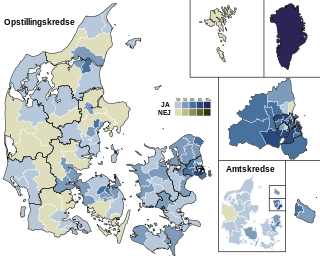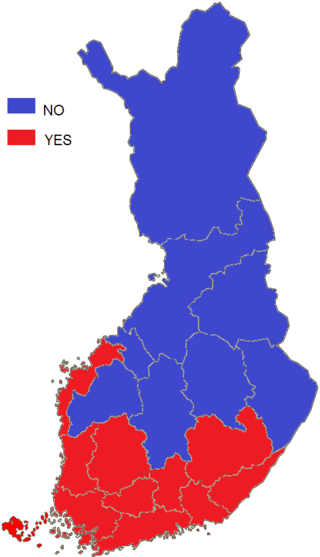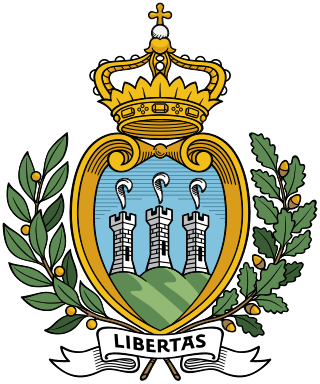
Folketing elections were held in Denmark on 3 April 1939, except in the Faroe Islands where they were held on 19 April. They followed a dissolution of both chambers in order to call a referendum on changing the constitution. The referendum was held on 23 May but failed due to a low voter turnout. The result of the elections was a victory for the Social Democratic Party, which won 64 of the 149 seats. Voter turnout was 79.2% in Denmark proper and 47.8% in the Faroes.

A referendum on the enlargement of the European Communities (EC) was held in France on 23 April 1972. Voters were asked whether they approved of Denmark, Ireland, Norway and the United Kingdom joining the EC, although Norway later voted in its own referendum not to join. The proposals were approved by 68.3% of voters, with a turnout of 60.2%.

A constitutional referendum was held in France on 21 October 1945. Voters were asked whether they approved of the Assembly elected on the same day serving as a Constituent Assembly, and whether until a new constitution was approved, the country would be governed according to a proposed set of laws that appeared on the ballot paper. If the first proposal had not been approved, the Third Republic would have been restored, but its approval led to the elected Assembly drafting a constitution and proposing it to the people a year later, resulting in the creation of the Fourth Republic. Both were approved by wide margins with a turnout of 79.8%.

A constitutional referendum was held in France on 13 October 1946. Voters were asked whether they approved of a new constitution proposed by the Constituent Assembly elected in June. Unlike the May referendum, which saw a previous constitutional proposal rejected, the new Constitution of 27 October 1946 was accepted by 53.2% of voters, and brought the Fourth Republic into existence. Voter turnout was 67.6%.

A referendum to approve the Évian Accords ending the Algerian War and granting self-determination to Algeria was held in France on 8 April 1962. It was approved by 90.8% of voters with a 75.3% turnout.

A referendum on lowering the voting age from 20 to 18 was held in Denmark on 19 September 1978. It was held after the Danish government lowering the age of majority from 20 to 18 in 1976. The change was approved by 53.8% of voters with a turnout of 63.2%. The electoral age had previously been lowered from 21 to 20 in a 1971 referendum, after a 1969 referendum had rejected lowering the electoral age to 18.

A referendum on lowering the voting age from 21 to 20 was held in Denmark on 21 September 1971. The change was approved by 56.5% of voters, with a turnout of 86.2%. A previous referendum had been unsuccessful in lowering the electoral age to 18 years, which was introduced after a 1978 referendum and which still stands.

A referendum on lowering the voting age from 21 to 18 was held in Denmark on 24 June 1969. The proposed change was rejected by 78.6% of voters with a turnout of 63.6%. Two years later, the electoral age was instead lowered to 20 years, and finally, after a 1978 referendum, to 18 years.

A referendum on reducing the voting age from 23 to 21 was held in Denmark on 30 May 1961. It was approved by 55% of voters with a 37.3% turnout.

A constitutional referendum was held in Poland on 25 May 1997. Voters were asked whether they approved of a new constitution. It was narrowly approved, with 53% voting in favour. Voter turnout was 43%, below the 50% required by the 1995 Referendum Act to validate the referendum. However, the Supreme Court ruled on 15 July that the 1992 'small' constitution took precedence over the Referendum Act and that the constitution could be introduced.
A constitutional referendum was held in Estonia between 14 and 16 October 1933. After two new constitutional drafts proposed by Parliament had been rejected by referendums in 1932 and June 1933, a third draft proposed by the radical right-wing Movement of Veterans of the War of Independence was approved by 72.7% of voters, with a turnout of 77.9%.

An advisory referendum on joining the European Union was held in Finland on 16 October 1994. 56.9% of voters approved of the proposal, with a voter turnout of 70.8%. Due to having its own customs jurisdiction, a separate referendum was held in Åland a month later, and was also approved.
A referendum on introducing direct elections for the Presidency was held in Hungary on 29 July 1990. Although the proposal was supported by 85.9% of voters, turnout was just 14%, resulting in the referendum being declared invalid. As a result, the President continued to be elected by the National Assembly.
A two-part referendum was held in Hungary on 5 December 2004.

An abrogative referendum on the electoral law was held in Italy on 18 April 1999. Voters were asked whether they approved of replacing the mixed-member proportional representation electoral system with one based solely on single-member constituencies, with the 25% of seats instead allocated to the second-placed in the constituencies with the most votes. The proposal was supported by larger parties, but opposed by smaller ones. Although the proposal was approved by 92% of voters, turnout was only 49.58%, resulting in the referendum being invalidated as the threshold of 50% was not passed.

A four-part abrogative referendum on fertility laws was held in Italy on 12 June 2005. Voters were asked whether research and access to the research on embryos should no longer be limited, whether embryos should no longer be legally recognised as people and whether IVF treatment should no longer be limited to three embryos. The referendum was called after the Italian Radicals collected the 500,000 signatures required. Although all four proposals were approved by wide margins, the voter turnout of 26% was well below the 50% threshold and the results were invalidated. Pope Benedict XVI had called for a boycott.

A referendum on the electoral law was held in San Marino on 3 July 2005. Voters were asked four questions on changes to the electoral law and electoral system. Although all four were approved by a majority of those voting, voter turnout was just 21.7%, meaning that the quorum of 32% of registered voters (10,143) was not achieved for any question. This resulted in all four questions failing, including two that proposed raising the quorum to 40%.
A referendum on the retrospective disclosure of the financial details of large-scale privatisation was held in Slovakia on 22 October 1994. Although approved by 95.9% of those voting, voter turnout was just 20% and the referendum was declared invalid due to insufficient turnout.
A referendum on holding early parliamentary elections was held in Slovakia on 11 November 2000. Although approved by 95.1% of those voting, voter turnout was just 20% and the referendum was declared invalid due to insufficient turnout.
A referendum on holding early parliamentary elections was held in Slovakia on 3 April 2004. Although approved by 87.9% of those voting, voter turnout was just 35.9% and the referendum was declared invalid due to insufficient turnout.









